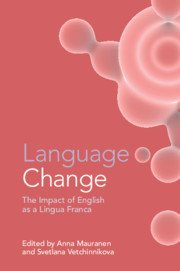Book contents
- Language Change
- Language Change
- Copyright page
- Contents
- Figures
- Tables
- Contributors
- Acknowledgements
- Abbreviations
- Introduction
- Part I Pooling Perspectives
- Part II Zooming in on ELF
- 7 ELF, Language Change, and Social Networks
- 8 ELF and Language Change at the Individual Level
- 9 Are Multilinguals the Better Academic ELF Users?
- 10 The Role of Co-Textual and Contextual Cues for Intelligibility in ELF Interactions
- 11 Exploring the Pragmatics of Computer-Mediated English as a Lingua Franca Communication
- 12 Development of Shared Multilingual Resources in ELF Dyadic Interaction
- 13 The Role of Translanguaging in ELF Advice Sessions for Asylum Seekers
- Index
- References
9 - Are Multilinguals the Better Academic ELF Users?
Evidence from a Questionnaire Study Measuring Self-Assessed Proficiencies
from Part II - Zooming in on ELF
Published online by Cambridge University Press: 17 December 2020
- Language Change
- Language Change
- Copyright page
- Contents
- Figures
- Tables
- Contributors
- Acknowledgements
- Abbreviations
- Introduction
- Part I Pooling Perspectives
- Part II Zooming in on ELF
- 7 ELF, Language Change, and Social Networks
- 8 ELF and Language Change at the Individual Level
- 9 Are Multilinguals the Better Academic ELF Users?
- 10 The Role of Co-Textual and Contextual Cues for Intelligibility in ELF Interactions
- 11 Exploring the Pragmatics of Computer-Mediated English as a Lingua Franca Communication
- 12 Development of Shared Multilingual Resources in ELF Dyadic Interaction
- 13 The Role of Translanguaging in ELF Advice Sessions for Asylum Seekers
- Index
- References
Summary
The question of putative multilingual advantages is still being hotly debated. Following some initial euphoria, the field is currently characterized by a wave of sobering criticism, as key findings fail to be replicated. Here we offer a summary of the current controversy, followed by a discussion of new evidence drawn from a questionnaire study of 1,454 students and 341 instructors at the University of Hamburg. This study measures self-assessed proficiencies in English among subjects who regularly use English as a lingua franca in the context of tertiary education. We compare self-assessed English proficiencies between monolingually and multilingually raised ELF users in five CEFR domains. The results attest slightly higher scores for multilingually raised ELF users, of statistical significance in some domains, which we interpret in terms of a multilingual advantage. However, we wish to be cautious about generalizing these findings, as they need to be substantiated by tests that objectively measure proficiencies.
Keywords
- Type
- Chapter
- Information
- Language ChangeThe Impact of English as a Lingua Franca, pp. 234 - 266Publisher: Cambridge University PressPrint publication year: 2020
References
- 2
- Cited by

